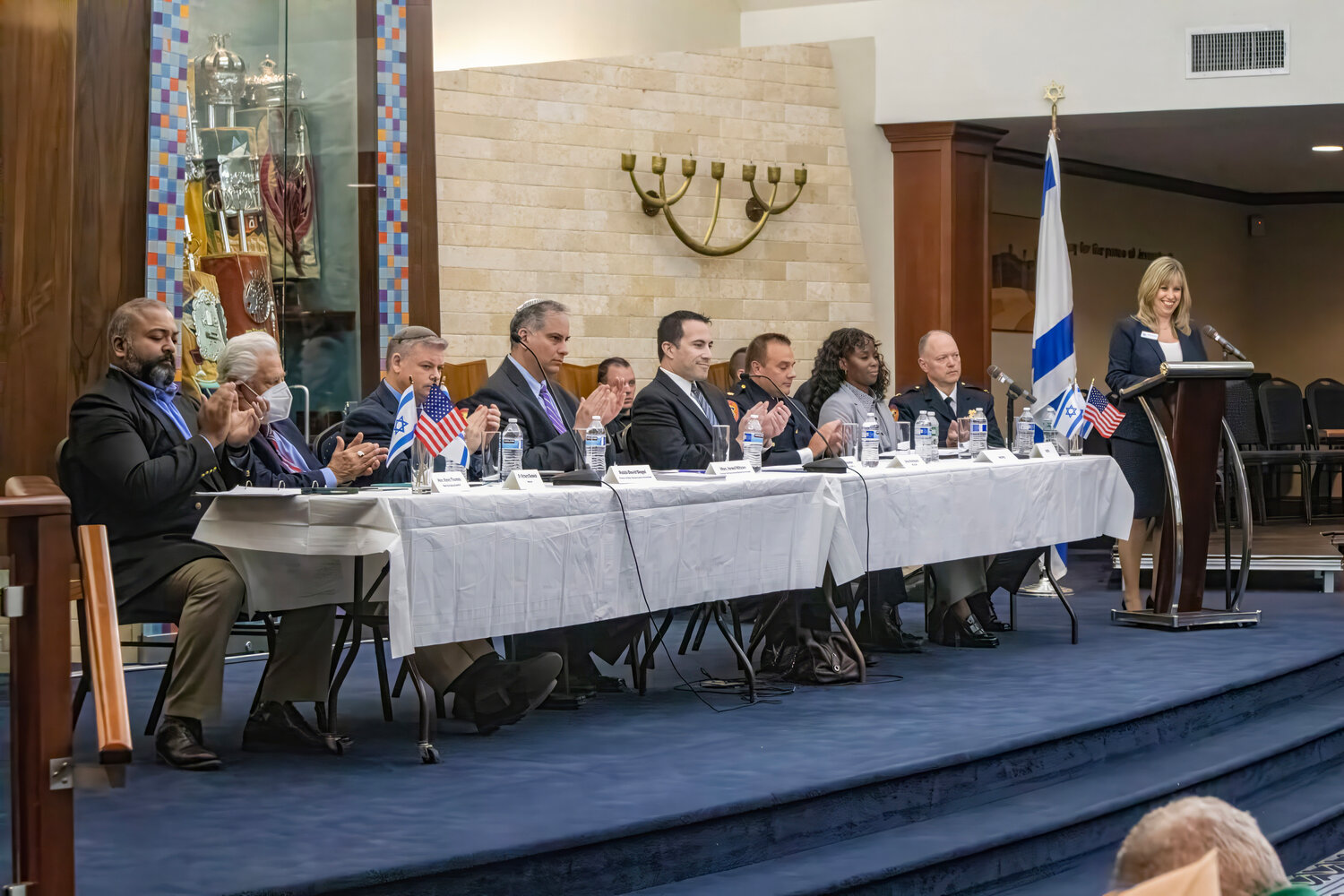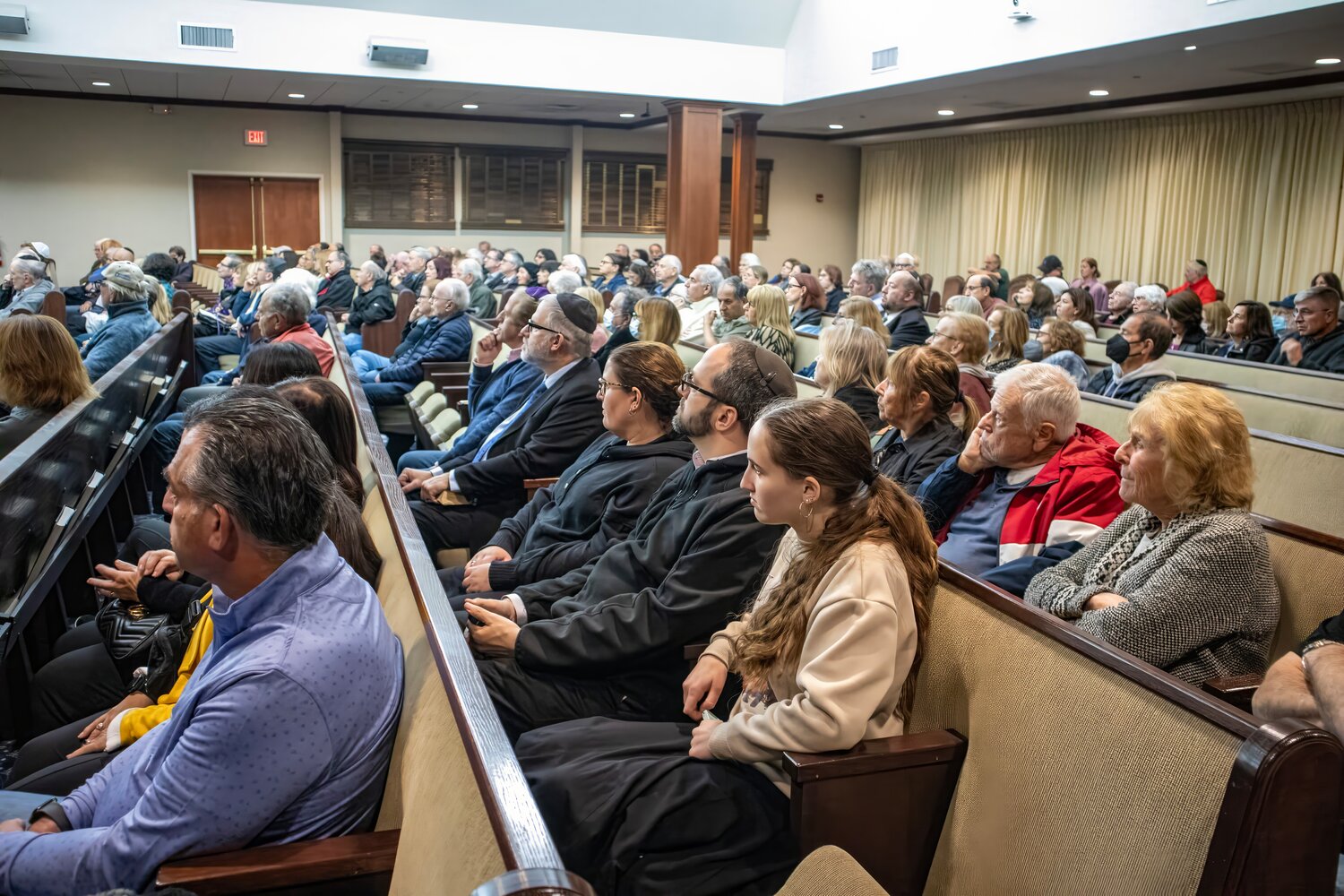Temple Avodah holds workshop on how to combat antisemitism
In a bid to address the rising concerns over antisemitism amidst the ongoing conflict in Israel, a diverse group of panelists met at Temple Avodah in Oceanside on Oct. 16 for an open discussion to foster unity and resiliency within the Jewish community.
The panel was composed of community leaders, offering a wide range of perspectives about how they could address hatred and prejudice.
The event, entitled “Combating Anti-Semitism Locally and Globally,” featured historian Dr. Richard Skolnik; Rabbi Dave Siegel, executive director of Nassau County Hillel at Hofstra University; Mindy Perlmutter, executive director of Jewish Community Relations Council; and representatives from the Nassau County Police Department and Nassau County District Attorney’s Hate Crimes Unit.
“I pray and wish for peace and hope to act in peace,” Rabbi Shai Beloosesky, spiritual leader of Temple Avodah, said. “If you hear someone with antisemitic talk attack you, check why. Don’t be passive and don’t be ashamed of your identity as a Jew or an American Jew.”
The Palestinian militant group Hamas, considered to be a terrorist organization, launched a surprise attack on Israel from Gaza on Oct. 7, leaving about 1,400 people dead and more than 4,000 injured. Since then, Hamas has only released two U.S. citizens from Gaza, with more than 200 people still held in captivity.
The Israeli government then declared war on Hamas, launching a counterattack, with Palestinian authorities estimating that at least 3,000 people were killed in the retaliatory attacks.
As the conflict plays out, numerous hate crimes and antisemitic incidents have been reported. In an effort to address the issues that many Jews are facing, several Nassau County law enforcement agencies have expressed their empathy and support while strategizing how the community can stay safe in their neighborhoods.
“When there is a bias incident, please do not hesitate to call 911,” Sabrina Gregg, Nassau County Police Department’s bias liaison officer, said. “Do not try to negate the situation on your own. Whatever it is that you need, there is nothing too small. Help us to help you.”
County police officials also explained the distinction between hate crimes, bias incidents and hate incidents. A hate crime involves violence motivated by bias against a person’s race, color, sexual orientation, gender, religion or other identity-based factors. A bias incident is the use of verbal, physical or visual language and behavior based on a person’s race, color, sexual orientation, gender, religion or other identity-based reasoning. A hate incident is the use of abusive or threatening speech or writing based on the victim’s identity.
Police said that while hate speech is not a criminal offense, there are ways to handle this type of discriminatory language, especially from social media users. The discussion also emphasized the role of social media and how antisemitic comments and messages can be spread online. Authorities advised that social media users refrain from responding to hateful antisemitic comments online.
“We need to have more clarity and push back against those who challenge the narrative and create the false impression and false equivalency between Israel and Hamas,” Israel Nitzan, former acting Consul General of Israel in New York, said. “The war is on both social media and the media. Emphasizing the facts is important so that people cannot challenge the narrative of what is going on.
“Many members of the community were murdered or taken to Gaza,” Nitzan added. “We need to support them. It’s going to be a very painful and long process of rebuilding these communities, rebuilding houses, schools, synagogues, parks and more. But we also need to rebuild emotionally and psychology, and they do need our support. This will be our main effort in the next coming weeks, to find ways that we can assist them in rebuilding their lives.”
Rabbi Siegel said combating anti-Semitism remains a major challenge for the Jewish community.
“The biggest thing with antisemitism is knowing your history, finding ways to get resources and talk to people in the community to understand their personal experiences and see how that affected them and their families,” Siegel said. “If we can stick together and learn about each other, then we have a chance of building community and peace.”









